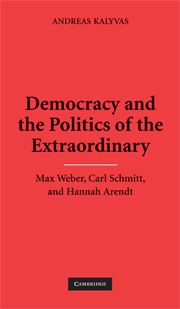Book contents
- Frontmatter
- Contents
- Acknowledgments
- List of Abbreviations
- Introduction: The Extraordinary and Political Theory
- I CHARISMATIC POLITICS AND THE SYMBOLIC FOUNDATIONS OF POWER
- 1 Revisiting Weber's Concept of the Political
- 2 Charismatic Politics
- 3 Disavowing Charismatic Politics
- II THE EXCEPTION AND CONSTITUTIONAL POLITICS
- III TAMING THE EXTRAORDINARY
- Conclusion: A Democratic Theory of the Extraordinary
- Bibliography
- Index
- References
2 - Charismatic Politics
Published online by Cambridge University Press: 04 August 2010
- Frontmatter
- Contents
- Acknowledgments
- List of Abbreviations
- Introduction: The Extraordinary and Political Theory
- I CHARISMATIC POLITICS AND THE SYMBOLIC FOUNDATIONS OF POWER
- 1 Revisiting Weber's Concept of the Political
- 2 Charismatic Politics
- 3 Disavowing Charismatic Politics
- II THE EXCEPTION AND CONSTITUTIONAL POLITICS
- III TAMING THE EXTRAORDINARY
- Conclusion: A Democratic Theory of the Extraordinary
- Bibliography
- Index
- References
Summary
Weber's critique of liberalism and Marxism is informed by an ambition to salvage the political from the tight grip of economic reductionism, instrumental rationality, and the normal politics of interest and utilitarian calculations. Although he never systematically spelled out this alternative wider concept of the political, he did claim that substantive values and symbolic meanings are more constitutive to the formation of political identities and to the shaping of collective action than interests are. He also argued that these values and meanings are themselves the outcome of prior symbolic struggles among charismatic movements and institutionalized organizations for the control of culture and the creation of beliefs and convictions that will directly influence the legitimate foundations of political authority – that is, the very sources of the exercise of political power. In what follows, I focus on these prior charismatic struggles over the control of symbolic power. This emphasis on charismatic politics might help revisit and further explore Weber's famous claim that although, during normal times, “material and ideal interests directly govern men's conduct,” in extraordinary moments “the world images that have been created by ‘ideas’ have, like switchmen, determined the tracks along which action has been pushed by the dynamic of interest.” My aim is to uncover and reconstruct the political, conflictual processes whereby a worldview becomes institutionalized after emerging victorious from a struggle with its rivals.
- Type
- Chapter
- Information
- Democracy and the Politics of the ExtraordinaryMax Weber, Carl Schmitt, and Hannah Arendt, pp. 46 - 64Publisher: Cambridge University PressPrint publication year: 2008



